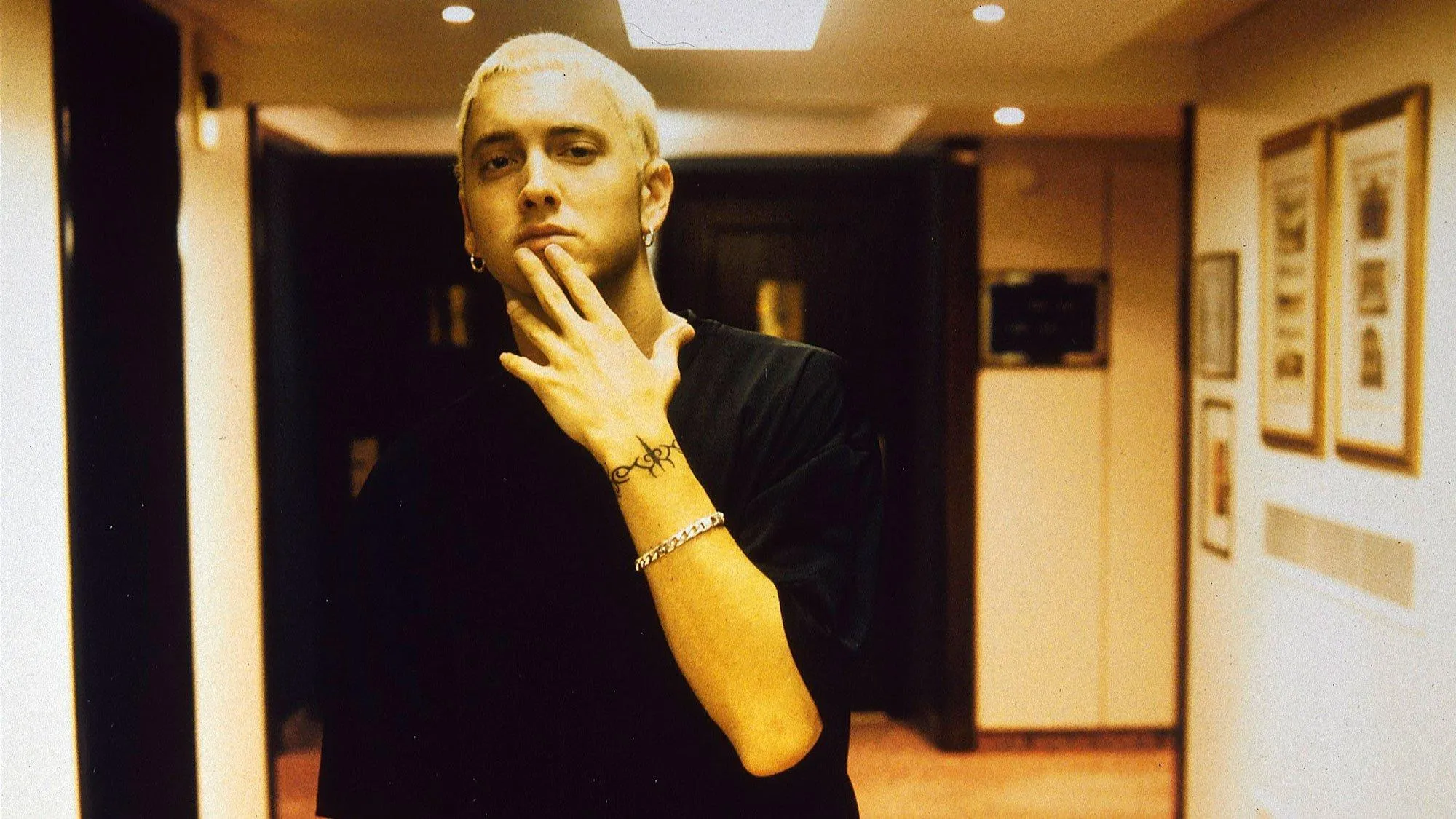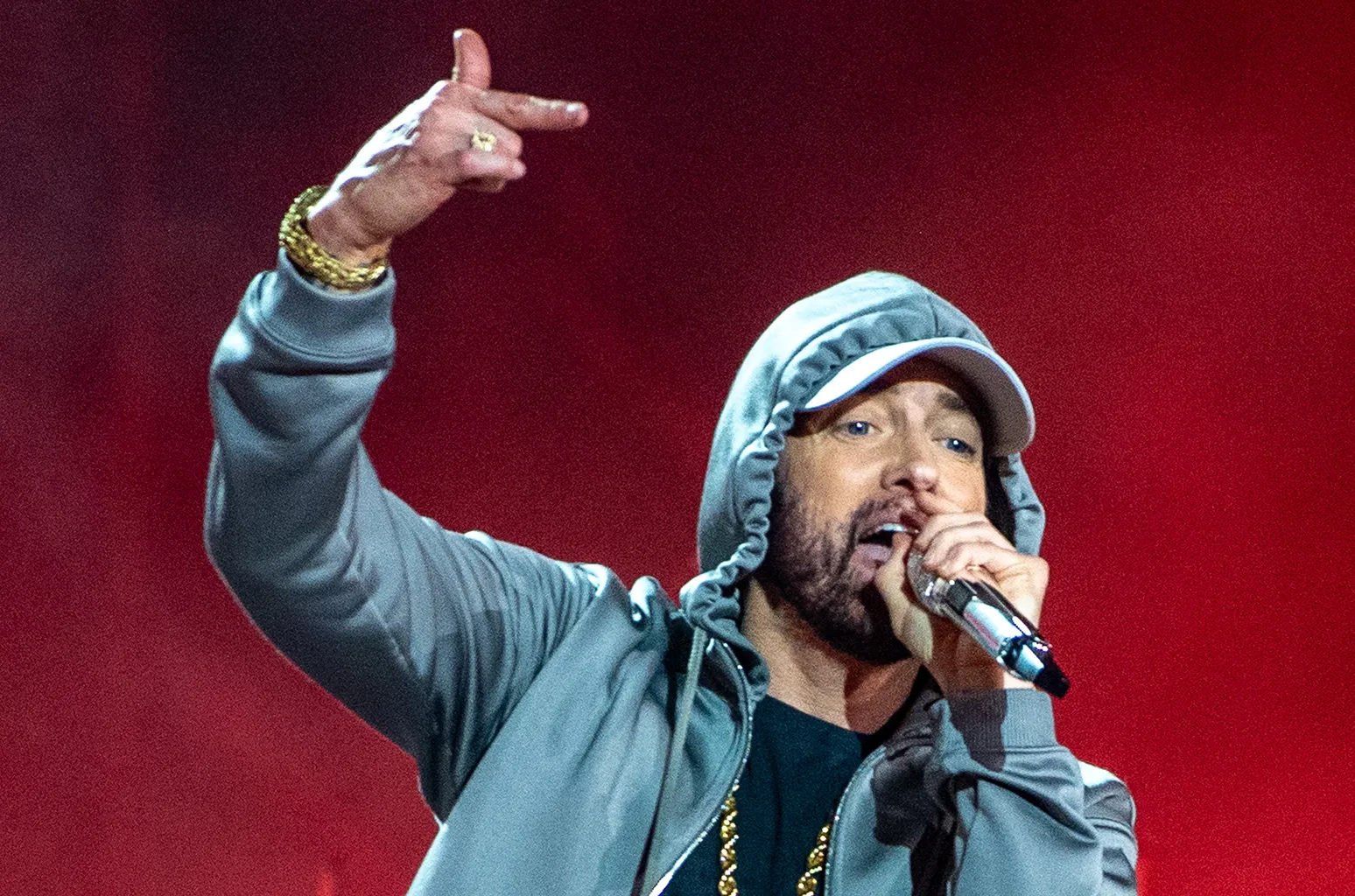

Everyone Thought Eminem Dropped a Heartfelt Track for Charlie Kirk — The Truth Will Make You Question Everything!
In the age of social media, rumors can spread faster than verified news, and the latest claim involving Eminem and Charlie Kirk is a prime example. A video circulating online recently alleged that the legendary rapper had released an “Emotional Tribute Song” for the late conservative activist Charlie Kirk. Fans and skeptics alike were quick to react — but did Eminem really release a song honoring Kirk? The short answer: No.
The Viral Claim That Shocked the Internet
On September 14, 2025, a video appeared on YouTube titled “Eminem – Charlie Kirk Home With The Lord | Emotional Tribute Song”. The video lasted 2 minutes and 22 seconds, featuring a montage of images and AI-generated audio that purportedly mimicked Eminem’s voice. The thumbnail showcased Eminem with somber imagery of Kirk, designed to provoke emotion and stir engagement.
Immediately, the clip went viral. Social media feeds across X, Instagram, and even TikTok were flooded with reactions, ranging from disbelief to outrage. Fans debated whether Eminem — known for his raw lyrics and cultural commentary — would even address the passing of a political figure in this way.
However, a deeper look into the video reveals some crucial disclaimers. The upload included a note stating that the content was “altered or synthetic”, meaning the audio and visuals were manipulated, AI-generated, or otherwise not genuine. For many viewers, this was a red flag.

What Does YouTube Say About ‘Altered or Synthetic Content’?
YouTube has implemented strict measures to combat misinformation, especially content created using AI tools. According to the platform’s guidelines:
-
Creators who manually disclose their content as “altered or synthetic” in the YouTube Studio workflow will have the label appear for viewers.
-
Videos created using YouTube’s generative AI tools (like DreamScreen) may be labeled automatically.
-
Content that includes valid Content Credentials (C2PA) indicating AI-generated material will also display a warning.
In essence, the video claiming Eminem honored Charlie Kirk was flagged by YouTube’s system for potentially misleading or AI-generated content. This disclosure is designed to protect viewers and reduce the viral spread of misinformation.
Checking Eminem’s Official Sources
To determine the validity of the claim, journalists and fact-checkers reviewed all official channels and platforms associated with Eminem:
-
Official Website: A search for “Charlie Kirk” on Eminem’s official website yielded zero results. None of the sections dedicated to videos, news, or music mentioned the activist.
-
YouTube Channel: Eminem’s official YouTube page (@eminem) was checked. No videos dedicated to Kirk appeared. None of the recently uploaded content referenced the tragic event.
-
Social Media: Posts on X (formerly Twitter) and Instagram were reviewed. Out of the three posts made by Eminem after September 10, 2025, none mentioned Kirk’s death. These posts instead focused on upcoming projects and personal updates, confirming no tribute had been made.
In short, Eminem has not released any song honoring Charlie Kirk, making the viral video entirely misleading.
Why the Hoax Spread So Quickly
Several factors contributed to the rapid spread of this misinformation:
-
AI-Generated Content: The video used synthetic audio that sounded convincingly like Eminem, which can easily fool casual listeners.
-
Emotional Hook: The title “Emotional Tribute Song” immediately triggers curiosity and an emotional response, encouraging users to click and share without verifying.
-
Timing: The video was uploaded shortly after Kirk’s tragic death, a period when online conversations were already highly sensitive.
-
Algorithmic Boost: YouTube and social platforms often promote content with high engagement — clicks, comments, and shares — inadvertently amplifying misleading clips.
This combination of AI manipulation, emotional appeal, and algorithmic reinforcement creates a perfect storm for viral fake news.
Understanding the Danger of AI-Generated Hoaxes
The Eminem-Charlie Kirk video serves as a case study for the growing threat of AI misinformation. Viewers may assume a video is authentic if the visuals and audio appear real, but AI can convincingly mimic voices, music styles, and imagery.
Experts warn:
-
Misinformation can damage reputations. Artists like Eminem may face backlash for content they never created.
-
Political figures and activists are vulnerable. Videos can falsely link public figures to statements or events.
-
Audience trust is eroded. Once viewers encounter repeated hoaxes, it becomes harder to distinguish fact from fiction.
For content consumers, the key takeaway is simple: always check official sources before believing viral claims.
How to Verify Claims Like This
To avoid falling for hoaxes, consider these fact-checking steps:
-
Check official channels: Websites, social media accounts, and verified profiles are reliable sources.
-
Look for disclaimers: Terms like “altered or synthetic content” signal AI or manipulated material.
-
Cross-reference news outlets: Credible outlets and fact-checking sites often report viral hoaxes.
-
Scrutinize the upload date: Content uploaded immediately after major events may be designed to capitalize on viral interest.
-
Use metadata tools: Video properties, content credentials, and AI detection tools can reveal manipulation.
By applying these strategies, audiences can avoid falling victim to viral misinformation.

The Broader Implications
The viral spread of the fake Eminem tribute is a microcosm of a larger problem: the weaponization of AI to create realistic but false content. As AI tools become more accessible, deepfakes, synthetic audio, and manipulated videos will increasingly challenge traditional journalism.
Industry experts predict:
-
More artists will be impersonated digitally. Celebrities may need to publicly address AI hoaxes regularly.
-
Platform policies will tighten. Social media companies are developing stricter labeling systems and AI detection algorithms.
-
Audiences must become media literate. Recognizing the signs of AI-generated content is essential to prevent misinformation from shaping public opinion.
Eminem’s situation is a cautionary tale: even the most iconic artists can be dragged into viral hoaxes that spread faster than truth.
Conclusion: What Really Happened
Despite viral rumors and widespread sharing, the evidence is clear: Eminem did NOT release a tribute song for Charlie Kirk. All official channels, including his website, YouTube, X, and Instagram, show no such content exists. The video in circulation is AI-generated or heavily manipulated, flagged by YouTube as altered content, and designed to exploit emotional reactions online.
For fans and casual viewers, the incident is a reminder to question viral claims, verify facts, and avoid sharing unconfirmed content. In the era of AI, not everything you see online is real, even if it looks and sounds convincing.


















